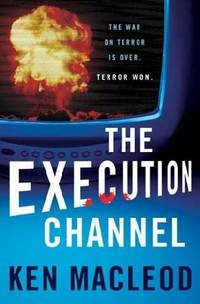 Ken MacLeod’s The Execution Channel is arguably the book William Gibson’s Spook Country should have been. MacLeod’s work is a little uneven, and eventually has a complete mindfuck ending, but it’s well worth reading just for the speculative political fiction.
Ken MacLeod’s The Execution Channel is arguably the book William Gibson’s Spook Country should have been. MacLeod’s work is a little uneven, and eventually has a complete mindfuck ending, but it’s well worth reading just for the speculative political fiction.
First and foremost, The Execution Channel is a near future spy thriller with some interesting speculative elements, bearing only the slightest bit of science fiction. Set in the UK, the key characters are Roisin Travis and her father James Travis. Roisin, a peace activist, happens to be near an RAF base in Scotland when it gets vaporized in a mysterious mushroom could. This sends things sideways in jolly old England while Roisin and James both go on the lam. Turns out that James is a bit of a mole, selling out the crown. Meanwhile, he trained Roisin in a bit of tradecraft, which she uses to try and make her way to their designated meeting place.
Potential thermonuclear detonation obviously escalates world tensions. MacLeod develops a bevy of ancillary characters to illustrate hidden surges of espionage, counter-espionage, propaganda, and disinformation. One of the more interesting persons is Mark Dark, one of those pajama wearing, basement blogging, conspiracy theorists, who just happens to actually have a line on what’s really going on. Dark stands in for the blogosphere which MacLeod brings to life as a real area of of action for clandestine information operation campaigns. In addition, there’s a passel of spook types filling a spectrum from brutal, ideology driven thugs to elegantly refined pragmatists.
Suffice to say careful attention pays well when reading The Execution Channel.
Where The Execution Channel improves on Spook Country is in the gritty meanness that’s probably a little more accurate to our times. The just plain nastiness of some of the operatives in action and post-disaster human behavior doesn’t get lost in effervescent slickness. Yet the feel of conspiracies within conspiracies is similar. MacLead also does a brilliant job of subtly twisting the milieu into a disconcerting alternative history. I did a couple of double takes when confronted with some of the political shifts deftly woven into the narrative. And while subtly presented, they are at the same time enormous yet insignificant. Hard to explain but definitely on of the more interesting aspects of the book.
MacLeod mainly trips up near the finish line. The concluding events seem rushed and rely on some seemingly manufactured coincidences. The absolute conclusion jarringly comes completely out of left field, although it is consistent with all of MacLeod’s prior foreshadowing. Finally, the eponymous “Execution Channel” is a slim chapter ending device that adds a sense of menace. However, it just up and disappears about 2/3 of the way through the book. Not sure what the intended commentary was but I certainly missed it.
The Execution Channel is far from perfect, but similar to MacLeod’s The Star Fraction, I found it worth reading if for nothing else its political provocations. As I said of that book, MacLead is most interesting not because of his ability to speculate about science, but his political thought hacking, said ability also applying to The Execution Channel. Recommended.